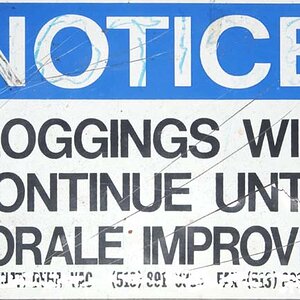Buckster
In memoriam
- Joined
- Sep 14, 2009
- Messages
- 6,399
- Reaction score
- 2,341
- Location
- Way up North in Michigan
- Can others edit my Photos
- Photos NOT OK to edit
I don't see that at all. I agree with Jerry.Most of our digital stuff won't be around in 5 years.
I still have the very first scans I ever did, made some 25 years ago. They are scans of physical photos of my daughter, and some other select photos I'd shot.
I just always made sure I had redundant copies on multiple backups, and updated any file formats or media types as needed. They were scanned to my new (huge at the time) 20MB hard drive, and backed up to 5.25", then eventually copied to to 1.44", then zip, then CD, then DVD.
My hard drive array has grown over that period of time from that whopping 20MB drive to 16 drives that total over 30TB of space to work with, and further backup to 2 separate cloud services. The first thing I do when I bring photos into my computer from my camera's card is run a backup of them to a redundant drive.
Unless electronics stop working forever, our digital stuff will be around for as long as anyone cares enough to take the minimal step needed in order to preserve it. The minimal step is: Backup, backup, backup, backup - to new media as available, converting to new formats if warranted.




![[No title]](/data/xfmg/thumbnail/32/32148-95f8731a01012cd472d3896791e3b7de.jpg?1619735233)
![[No title]](/data/xfmg/thumbnail/32/32157-d34c504b7ccf1335e959a8a2be6cfacc.jpg?1619735234)





![[No title]](/data/xfmg/thumbnail/32/32151-8f2e9547814c70d611d42980b03d275d.jpg?1619735233)

